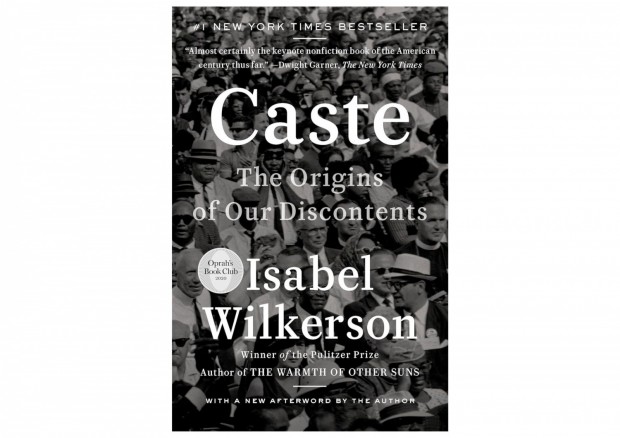Deconstructing Discontent: A Review of 'Caste: The Origins of Our Discontents' by Isabel Wilkerson

Read our thoughtful review of "Caste: The Origins of Our Discontents" by Isabel Wilkerson. This book is a profound exploration of societal structures and their impact. (Photo : Amazon/Isabel Wilkerson)
In her book "Caste: The Origins of Our Discontents," Isabel Wilkerson discloses an overlooked reality in American society: a powerful yet hidden caste system. Reaching beyond race and class, Wilkerson describes how this rigid caste system affected individuals' lives or personalities by looking at the parallel between Indian and Nazi German caste systems.
She uses immersive narratives, including people like Martin Luther King and Satchel Paige, in her storytelling approaches to discuss the subtle methods through which caste affects everyday life. The health costs and implications of culture are examined by marshaling historical comparisons, suggesting ways toward overcoming divisive human divisions to offer a thought-provoking reexamination of America's social fabric.
The Author
Wilkerson is an award-winning author who was born in Washington, D.C. She won the National Book Critics Circle Award for her debut work and became the first African-American woman in history to win the Pulitzer Prize in journalism in 1994.
Wilkerson's detailed research and storytelling abilities reveal the histories of six million people who migrated from the Jim Crow South. Regarded as a leading authority on narrative nonfiction, she has taught at the world's top universities.
A Profound Exploration of the American Caste System
A review by Frontiers said that the book provides a comprehensive exploration of the American caste system, utilizing a narrative approach that weaves together many stories to depict various facets of life under its influence. The book discusses its origins and modern manifestations, paralleling Nazi Germany with India. Wilkerson uses the accounts of people such as Paige and herself to show how it seeps into every corner of life.
The narrative method, backed by diverse stories, effectively communicates the pervasive and detrimental nature of caste, portraying it as an oppressive force with far-reaching consequences. The book serves as a poignant reminder that America's historical issues persist, emphasizing the need for societal acknowledgment and change.
Embedded Caste System and Its Parallels
As mentioned in a report by The Guardian, the author undertakes an elaborate investigation of the American caste system and compares them with Indian caste system, also drawing parallels to Nazi Germany. Wilkerson focuses on the rooted essence of the American caste system, pointing out its history, manifestation, and implication in society.
Morever, the book discusses caste in relation to race and emphasizes how the two intersect for structural power dynamics with caste. Wilkerson unwraps the brutal history of the American caste system, such as slavery, lynching, and institutionalized inequalities that endure even to this day.
The author believes caste works subtly, nurturing and sustaining hierarchy and inequality even from innocent conditions. While acknowledging the dismantling of the caste system in Nazi Germany, Wilkerson underscores the ongoing challenges and blind spots in addressing caste-related issues, particularly in India.
"Caste" is praised for its narrative approach and timely exploration of white privilege, power, and supremacy in America.
Isabel Wilkerson's Argument
An article by NPR stated that Wilkerson's argument in "Caste" centers on three historical caste systems: Indian, Nazi, and American. She reveals the Nazis' study of American racism when formulating their caste system. Wilkerson's extensive research exposes the violent acts of the American caste system, even prompting hesitation from Nazi researchers due to its extreme nature.
The author contends that caste relies on dehumanization, evident in the horrific experiments on Jews and Blacks in Germany and the U.S. Wilkerson's analysis, supported by historical evidence, underscores the parallels between these systems and emphasizes the dehumanizing impact inherent in caste structures.
RELATED ARTICLE: Lessons on War and Justice
© 2023 Books & Review All rights reserved.
Popular Now
1
Books to Read After 'Fourth Wing': Top Picks for Fantasy and Romantasy Fans

2
‘The Secret Public’ by Jon Savage Book Review: An Insightful Look Into the LGBTQ Influence

3
Stephanie Regalado's 'If They Only Knew' Column Is Now A Book, Unleashing 60 Anonymous True Stories to Empower Women

4
'No Wire Hangers' Scene That Almost Did Not Happen: New Book Reveals Faye Dunaway's Struggles

5
Rare First Edition of Aphra Behn's Novel 'Oroonoko' Discovered in Kent: A Historic Literary Find

Latest Stories
Book Reviews
‘The Secret Public’ by Jon Savage Book Review: An Insightful Look Into the LGBTQ Influence

Book News
Stephanie Regalado's 'If They Only Knew' Column Is Now A Book, Unleashing 60 Anonymous True Stories to Empower Women

Book News
'No Wire Hangers' Scene That Almost Did Not Happen: New Book Reveals Faye Dunaway's Struggles

Book Reviews
‘The Perfect Couple’ by Elin Hilderbrand Book Review: A Captivating Summer Mystery

Book News
New Book ‘The Franchise’ Reveals Penguins President Kyle Dubas’ ‘Biggest Mistake’ as Maple Leafs GM











